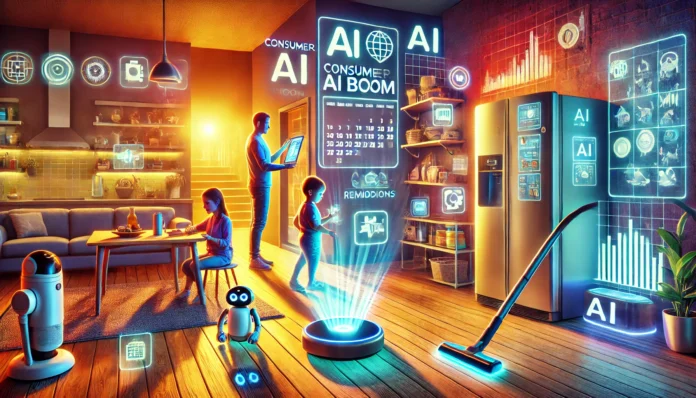Artificial intelligence (AI) has rapidly become an integral part of daily life, powering devices and applications that offer convenience, personalization, and improved functionality. Two areas where consumer-facing AI is making significant strides are wearables and virtual assistants. These technologies are reshaping how we interact with devices, manage health, and organize our lives.
AI Wearables: Personalized Technology for Better Living
AI wearables have moved beyond simple step counters to become sophisticated tools that monitor health, enhance productivity, and improve daily life. From fitness trackers to augmented reality (AR) glasses, these devices are revolutionizing personal technology.
Health and Fitness Tracking
AI-powered wearables like the Apple Watch and Fitbit now analyze complex health metrics, including heart rate variability, sleep quality, and oxygen saturation.
- AI in Action: The Apple Watch uses machine learning to detect irregular heart rhythms, potentially warning users of conditions like atrial fibrillation.
- Impact: These insights allow users to make informed decisions about their health, often before problems become serious.
Augmented Reality Wearables
AR glasses, such as Snap Spectacles and Nreal Light, are merging AI with visual augmentation to enhance daily tasks.
- Applications: Navigation, hands-free task assistance, and immersive gaming.
- Future Prospects: AR wearables may soon replace smartphones as primary personal devices, offering seamless integration with AI-driven environments.
Challenges
- Data Privacy: Wearables collect vast amounts of personal data, raising concerns about how this information is used and stored.
- Battery Life: As AI functionality grows, so does the demand for energy, making battery life a key limitation.
AI-Powered Assistants: The Next Generation of Interaction
Virtual assistants such as Amazon Alexa, Apple Siri, and Google Assistant are evolving, incorporating generative AI to provide more natural and contextual interactions.
Enhanced Conversational Abilities
Generative AI enables assistants to understand context better, engage in extended conversations, and even learn from user preferences.
- Example: Alexa’s “hunches” feature predicts user needs, such as reminding them to lock the door or turn off the lights based on past behavior.
- Result: These assistants are no longer just reactive; they are becoming proactive companions.
Home Automation Integration
AI assistants are at the heart of smart home ecosystems, managing devices such as thermostats, lighting, and security cameras.
- Popular Tools: Google Home and Amazon Echo dominate the market, connecting with a range of third-party devices.
- Advancements: AI is making these systems more intuitive, learning habits and adjusting settings autonomously.
Challenges
- Voice Recognition Bias: AI assistants may struggle with accents or diverse speech patterns, limiting accessibility.
- Ethical Concerns: The possibility of misuse, such as unauthorized recordings or hacking, remains a concern for consumers.
The Consumer AI Boom: Opportunities and Considerations
Opportunities
- Customization: AI allows for hyper-personalized experiences, tailoring devices and applications to individual needs.
- Health Improvements: Wearables promote preventive healthcare by offering real-time insights.
- Convenience: Virtual assistants simplify everyday tasks, saving time and effort.
Considerations
- Privacy and Security: Companies must prioritize data protection to gain consumer trust.
- Accessibility: Developers should ensure AI tools are inclusive and usable for all demographics.
- Sustainability: The growing demand for AI devices raises questions about environmental impact, particularly in production and disposal.
Conclusion
The consumer AI boom is revolutionizing personal technology, making devices smarter, more intuitive, and indispensable. AI wearables are redefining health and fitness monitoring, while virtual assistants are becoming proactive companions that enhance daily life.
However, with great potential comes great responsibility. Issues surrounding privacy, accessibility, and sustainability need to be addressed to ensure these innovations benefit all. As AI continues to evolve, it will undoubtedly shape the future of how we interact with technology and live our lives.





